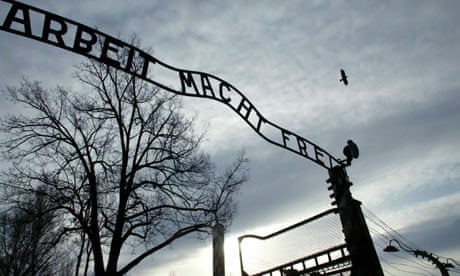The iron sign bearing the Nazi slogan "Arbeit Macht Frei" that spanned the main entrance to the former Auschwitz death camp was stolen before dawn today, Polish police said.
The sign with the German words for "Work Sets You Free" is believed to have been stolen from the gates of the Auschwitz memorial between 3.30am and 5am, when museum guards noticed it was missing and alerted authorities, said a police spokeswoman, Katarzyna Padlo.
The five-metre-long, 40kg sign across a gate at the main entrance to the former Nazi death camp in southern Poland, where more than 1 million people died during the second world war, was unscrewed on one side and pulled off on the other, Padlo said. A spokesman for the Auschwitz museum, Pawel Sawicki, called the theft a "desecration" and said it was shocking that the tragic history of the site did not stop the thieves. In Brussels, the European parliament president, Jerry Burzek, appealed for the sign to be returned "out of respect for the suffering of over a million victims".
Another museum spokesman, Jaroslaw Mensfelt, said the thieves carried the sign 300 metres to an opening in a barbed-wire gap in a concrete wall. The opening had been left intentionally to preserve a poplar tree dating back to the time of the war.
Fifty criminal investigators and a sniffer dog were sent to the grounds of the vast former death camp, where barracks, watchtowers and the ruins of gas chambers stand as testament to the atrocities inflicted by Nazi Germany on Jews, Gypsies and others.
The sniffer dog led police to a spot outside the wall where the sign left an imprint in freshly fallen snow, then to a roadside where the sign appeared to have been loaded on to a getaway vehicle. A 5,000-zloty (£1,000) reward has been offered to anyone who can help track down the perpetrators.
Padlo said there were no suspects but police were pursuing several theories.
Another police spokesman told TVP Info television: "The whole area is under surveillance. There are many cameras there. We are now analysing the film. I hope we will find the trail."
Yad Vashem, the Holocaust remembrance centre in Jerusalem, told Reuters the theft was "an attack on the memory of the Holocaust". Noach Flug, president of the International Auschwitz Committee in Jerusalem, said it "deeply unsettles the survivors" and the sign "has to be found".
Poland's chief rabbi, Michael Schudrich, said the thieves were guilty of desecrating a site of immense importance.
"If they are pranksters, they'd have to be sick pranksters, or someone with a political agenda. But whoever has done it has desecrated world memory," he said.
"Auschwitz has to stand intact because without it, we are without the world's greatest physical reminder of what we are capable of doing to each other."
Sawicki said the museum authorities had already replaced the sign with a replica, which was used briefly a few years ago when the original was being repaired.
The original sign was made in the summer of 1940 by non-Jewish Polish inmates of Auschwitz in an iron workshop at the camp. After occupying Poland in 1939, the Nazis established the Auschwitz I camp in the southern Polish city of Oswiecim and initially used it for German political prisoners and non-Jewish Polish prisoners.
"We believe that the perpetrators will be found soon and the inscription will be returned to its place," said Sawicki.
The slogan "Arbeit Macht Frei" was used at the entrances to other Nazi camps, including Dachau and Sachsenhausen, but the long, curving sign at Auschwitz is perhaps the best known.
More than a million people visit the Auschwitz site every year, but the barracks and other structures are in a state of disrepair and Polish authorities have been struggling to find the funds to carry out conservation work. This week, Germany pledged €60m to an endowment that will fund long-term preservation work – half the amount that Auschwitz memorial museum officials say is needed.








